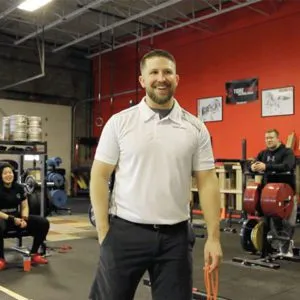The internet. A blessing and a curse. Especially in the world of fitness. On one hand you have access to an almost infinite amount of information about exercise and nutrition. On the other hand, anyone can put incorrect information online, meaning that you’ll have to navigate a complex web of data, making it difficult to discern what is legitimate, and what is not. Prior to the outburst of social media, in order to become a personal trainer, you would have to get a job working at a gym, or open your own personal training studio. Both would be difficult to do without a certification, as most gyms wouldn’t hire you without a certification, and starting a business from scratch with no credentials was risky, and difficult. In 2019, soon-to-be personal trainers have hundreds if not thousands of options for a personal trainer certification, because in the internet age, everything has become a business unto itself. There are even options now where one can pay a nominal fee, and simply receive a certificate without even taking a test. But in 2019, you don’t even need a personal trainer’s certification to gain any street cred. In fact, you don’t even need to work at a gym or have your own studio. Anyone with a smart phone, a Facebook account, and some money to spend on advertising can get their product or service into your news feed. Where previously coaches and trainers had to be good at their job to grow their client base, in the modern age, a nice body and the willingness to show it off will often do. And when coaches of yesteryear made a living by building meaningful relationships with clients, coaches now sling “online templates” and other generic “info products” that are designed to be “passive income.” In other words, things that they can profit from without having to to spend much actual time or effort on once they’re up and running.
Fitness vs. Experience
I started training clients in 2005. Back in the mid 2000s, I was in my early 20s, and from an aesthetic standpoint, in the “best shape of my life,” but I
was also a fledgling in terms of coaching clients. It’s relatively easy to be in shape when you’re in your 20s. Your body is very pliable, and hormonally superior to people of an older age. In 2016, I was arguably in the worst shape of my life. Completely over stressed running a business, dealing with a heart condition, and having lost my passion for my own fitness I was weighing in well over 300lbs. Yet even in my difficult physical condition, I was 10x the coach I was when I was 10% body fat. That’s because the skills necessary to be an effective coach and an effective athlete/client are very different. No one asks Bill Belichik how many touch down passes he threw last year, and that’s because it’s not his job to throw touchdowns.
Spend a little time on a social media platform like Instagram and do a search for a fitness or nutrition related hashtag. You might be surprised by what you find. Many posts feature fit looking people wearing minimal clothing in sexually provocative poses. What’s interesting is these images are usually accompanied by seemingly well meaning bodies of text about working out, nutrition, mindset, etc… So what does a picture of a woman in a thong bikini have to do with counting macros or sets and reps? Well, nothing really. The reason these people do it is because it grabs your attention. If you want to look like the person in the picture, you may want to follow them and buy their products/services. With these new tactics, it’s no longer the best trainers and coaches that become the most successful, but rather the coaches and trainers that are best at marketing themselves, and unfortunately a large part of social media marketing is now based around selling a look, rather than selling results.
What to look for vs. What to Look Out For
Because a coach’s job is to produce results in clients, first you want to look for a coach that has a diverse portfolio. If a coach heavily markets themselves, that makes me question if they know how to produce results in anyone other than themselves. Clients come with a diverse range of challenges and goals. If a coach is unable to handle the obstacles to get clients to their goals, who cares how good they are at training themselves?
The next thing you want to look for is a coach that either has a brick-and-mortar business, or works in person with clients. In other words: be weary of anyone that only trains clients online. While the appeal of running an online business is there for coaches, you simply cannot have as big of an impact on your clients, and you don’t learn as much as a coach when you work only online.
Keep an eye on how a gym, program, or coach markets and the materials they use. If a gym uses a lot of “stock” media (like pictures, or videos that they licensed from a third party), then I would steer clear. This means they don’t have real clients they are working with, and if they do, they aren’t getting good enough results to share them online. Take a closer look next time you see an ad from a gym, you might be surprised how many facilities actually go this route, and in my opinion it’s highly dishonest to do so.
Watch out for anyone that advertises how “fast” you’ll get results. Anyone who knows what they’re doing in this industry knows that change takes time, because you are a result of your habits, and your habits have been built over many years. Even if you do everything “perfectly,” we won’t get into great shape overnight. Most meaningful transformations take a year or sometimes even more. Anyone advertising how fast a program works is either lying to you, or their methods aren’t sustainable over the long term, which in the end, makes them useless. It’s difficult to market the truth: it’s not glamorous, and it’s a tough sell to tell someone “you’re a year or more from your goal.” but the best coaches do this job because they’re interseting in making a difference in the lives of their clients. Not just making a buck.
Lastly be on the lookout for anyone primarily selling a product rather than service. Products (like supplements, workout templates, etc…) sell you on the idea that you’ve just been missing “this one thing” and once you have that one thing, all of your fitness dreams will come true. When you work with a good coach, you’re paying for a service. You’re paying for the coach’s expertise. You’re paying for a wealth of experience, problem solving ability, and guidance. A product is something that can be packaged, mass-produced, and sold off. There’s no real product in the world that has a meaningful impact on your fitness that can be packaged and sold. So steer clear of anyone pushing a product.
Trusting the Program
I would be remiss if I didn’t mention: If you are paying for a coach or program right now, you owe it to yourself (and whoever you’re paying) to trust the program. My most successful clients over the last 14 years have been those who have come in, done what we asked them to do, and that’s it. Over the years I’ve also had dozens of clients who felt like they knew better than I (or one of the other coaches I work with) did. These people are constantly changing the plan without communicating with their coach. They also have something else in common: They usually don’t get the results they wanted. In fact never in 14 years have I had a client be 100% compliant with their program only to be left scratching our heads with why it didn’t work. Not once. Ever.
If you’re currently questioning if the program you’re doing is working, you have to give it a fair shake before you throw it out with the trash. Ask yourself the following questions:
- Have I given this enough time to work (30 days minimum, but 90 days preferably)
- Have I given this program 100% or have I cut corners?
- Have I been communicating with my coach about what I need/want, and what I’m actually doing
- Have I asked questions when I wasn’t sure about something, or just made a guess about what I’m supposed to do?
Don’t fire your coach, change your method, or throw the baby out with the bath water if you aren’t 100% honest with yourself first. And if you haven’t been honest with yourself, start there.
Spend Your Resources Wisely
In the end, we have a finite amount of time, energy, and money to spend on our health and fitness, so make sure you do your homework before you spend any of it. There’s nothing more heart breaking to me as a coach than watching someone go all-in on an ineffective program or working with an under qualified coach. To be fair to all the bad coaches out there, I’m sure most of them are well-meaning, but just like there are no shortcuts to your fitness, there are also no shortcuts to becoming a good coach. So while we would all love to be social media influencers overnight, and have money rolling in from ad revenue, and paid sponsorship, the reality is, when the dust settles, the best coaches will still be here, and everyone else will be long gone, and if you are trying to leap frog the process of paying your dues and developing yourself as a coach, your clients will be long gone too.






